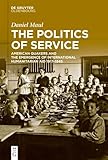The Politics of Service : American Quakers and the Emergence of International Humanitarian Aid 1917–1945 / Daniel Maul.
Material type: TextPublisher: Mnchen ; Wien : De Gruyter Oldenbourg, [2024]Copyright date: 2024Description: 1 online resource (X, 334 p.)Content type:
TextPublisher: Mnchen ; Wien : De Gruyter Oldenbourg, [2024]Copyright date: 2024Description: 1 online resource (X, 334 p.)Content type: - 9783110675597
- 9783110675917
- 9783110675795
- Humanitarian assistance, American
- Humanitarianism -- Religious aspects -- Society of Friends
- Society of Friends -- United States -- History -- 20th century
- Society of Friends -- United States -- History
- 20. Jahrhundert
- American Friends Service Committee (AFSC)
- Hilfsorganisation
- Quäker
- HISTORY / Modern / 20th Century
- 20th century
- Aid organization
- American Friends Service Committee (AFSC)
- Quaker
- humanitarian aid
- 360
- BX7637 .M3813 2023
- online - DeGruyter
- Issued also in print.
| Item type | Current library | Call number | URL | Status | Notes | Barcode | |
|---|---|---|---|---|---|---|---|
 eBook
eBook
|
Biblioteca "Angelicum" Pont. Univ. S.Tommaso d'Aquino Nuvola online | online - DeGruyter (Browse shelf(Opens below)) | Online access | Not for loan (Accesso limitato) | Accesso per gli utenti autorizzati / Access for authorized users | (dgr)9783110675795 |
Browsing Biblioteca "Angelicum" Pont. Univ. S.Tommaso d'Aquino shelves, Shelving location: Nuvola online Close shelf browser (Hides shelf browser)
Frontmatter -- Acknowledgments -- Contents -- Introduction: Humanitarian Identity and the Politics of Service -- 1 “Lay upon us the burden of the world’s suffering”: Quaker Humanitarianism before the First World War -- 2 Constructive Service: The First World War and the Founding of the American Friends Service Committee -- 3 A New Pennsylvania: The Quäkerspeisung in Germany 1919–1923 -- 4 Swallowed by Lions and Eagles: The AFSC in the Soviet Union 1921–1923 -- 5 What’s the Message? The AFSC between Home and Foreign Service 1919–1935 -- 6 The Quakerly Approach at Its Limits: The AFSC and Nazi Germany 1933–1939 -- 7 Contested Neutrality: The AFSC in the Spanish Civil War -- 8 Everyone’s Friend? The AFSC, the Second World War, and the Tensions of Humanitarian Aid Twenty-Five Years On -- Archival Sources -- Bibliography -- Index
restricted access online access with authorization star
http://purl.org/coar/access_right/c_16ec
This book provides the first comprehensive history of the American Friends Service Committee (AFSC), the central aid agency of the Religious Society of Friends or Quakers, from 1917 to 1945. Implying a thoroughly transnational approach, it sheds a light on the important role American Quakers played in the emergence of a humanitarian sector both within the USA and beyond. Through the Quaker lens the book adresses important tensions inherent to the history of humanitarianism in the 20th century: Following the AFSCs aid operations from the First World War, through post-war Germany and Soviet Russia to the Spanish Civil War and into the Second World War, it deals with the AFSC’s conflicting roles as a specifically American aid organization on the one hand and its position within transnational religious and pacifist networks on the other and it opens a window to processes of professionalization, the development of a humanitarian “market place” and the complex relationship of religious and secular strands in the history of international relief.
Issued also in print.
Mode of access: Internet via World Wide Web.
In English.
Description based on online resource; title from PDF title page (publisher's Web site, viewed 20. Nov 2024)









